Door Into Silence (1991)
Directed by: Lucio Fulci
Written by: Lucio Fulc, Lucio Fulci
Starring: Jennifer Loeb, John Savage, Richard Castleman, Sandi Schultz
AKA LE PORTE DEL SILENZIO
ITALY
AVAILABLE ON DVD: REGION 1 AND REGION 2 ITALY ONLY
RUNNING TIME: 91 mins
REVIEWED BY: Dr Lenera
Melvin Devereax is a successful businessman in real estate whose father died in a car crash. He’s just finished work in New Orleans for the day and intends to return to his house in Baton Rouge after a visit to his father’s grave. However, he can’t seem to get home. The highway is shut down ahead, so he has to take backroads. He starts to see a mysterious lady who seems to be wherever he goes. It’s also constantly 7.30am. And there’s a hearse whose driver seems to be a road hog in the most serious way. Is Melvin going mad?
Way back in 1992, I attended a convention in London which was dedicated to Lucio Fulci. Accompanied by David Warbeck of The Black Cat and The Beyond, he was there himself, looking ill and tired but happy to sign memorabilia and speak before us on stage several times despite needing a translator. The day began with a screening of The Beyond in its UK cinema version, so it was missing some of the gruesome highlights, yet it was still great to see this masterpiece on the big screen. And it ended with a screening of Zombie Flesh Eaters [aka Zombie] which was in Italian language with no subtitles but which was totally uncut; one of the organisers had brought over a complete print from Italy which was actually illegal at the same time since the uncut version was banned in the UK. Of course both screenings went down very well. And then sandwiched in the middle there was Door Into Silence, which I later found out Fulci had specifically requested it be the other film that we saw. It’s often easy to tell when an audience aren’t enjoying something, so, even though we all watched it respectfully with no walkouts, it wasn’t a surprise after the screening to hear people slagging it off. I certainly wasn’t alone in finding it a repetitious bore whose supposed twist was so obvious early on that I wondered if Fulci had made it for total idiots. Well, I’ve finally revisited the man’s final work, and actually found it not to be anywhere near as bad as all that, even though it’s definitely a film that’s not fully achieved.
As I often do, I did wonder whether to reveal said twist in this review, but it only took me a few minutes to realise that a fairly detailed discussion of this movie would be virtually impossible without doing so, and anyway you’ll probably realise what’s going on very quickly. In fact, you may realise what’s going on just from my synopsis of the third quarter or so at the top of this review. So what we have here is virtually a combination of Duel and Ambrose Pierce’s highly influential short story An Incident At Owl Bridge, though it’s also an expansion of a short story written by Fulci called porte del nulla [Gates Of Nothingness] produced by no less than Joe D’ Amato, who later claimed it was the best movie he ever produced. A few months ago I did a write-up of the cheapie creepy classic Carnival Of Souls which was along similar lines as the Pierce tale. Door Into Silence isn’t anywhere near as good as Herk Harvey’s existential chiller, yet it can’t help but compel a bit because of the premise of somebody not knowing that they’re dead. Well, it can’t help but compel me, possibly because I’m certainly not a young man these days, and most definitely because it fits in with A Cat In The Brain and Voices From Beyond as showing a filmmaker aware of the fact that his days were numbered due to continual bouts of ill-health, and confronting this in the best manner possible; with his art. It also seems like a genuine attempt at being artful; this doesn’t quite come off largely due to some of the sloppiness that characterises most of Fulci’s work, but one can see him trying, while the ambiguity of a lot of what we see recalls the dreamlike near-surrealism of Fulci’s Golden Period even if there’s a deliberate avoidance of bloodshed and no money to show much that’s out of the ordinary.
An image of the sun rising leads to several close-ups representing a car crash. In a rather disorientating sequence, the funeral procession is inter-cut what seems to be the point of view of someone walking about the graveyard with extremely loud footsteps, probably in a different time zone to the funeral. Then we see our protagonist staring at a grave, that of his father, though we only see the surname ‘Devereux’. Hmmm – well – I’ll be surprised if, when odd things start to happen, nobody thinks of this beginning and puts two and two together. Maybe Fulci intended to make it so obvious, who knows? He did sometimes make very strange decisions in his films. A woman is watching Melvin as he thanks his dad for teaching him how to be successful, and that, “nobody is as important as I am” . The woman comes over and speaks to him, addresses him by name, even though he cannot remember having met her before. “You’re in a hurry today. Mr. Devereux” she says enigmatically before the Anglosised credits come up which call Fulci ‘H. Simon Kittay’, a very odd name indeed. Everything this lady says is enigmatic as she keeps on showing up then disappearing; well, it’s not as enigmatic to us as she clearly seems to be from a different plane of existence, maybe some kind of ‘messenger’. Just as weird is this hearse that keeps on driving appearing and driving in front of Melvin very slowly, not letting him overtake. But then everything seems to be transpiring to not let him get home; detours, wrong turns, car trouble, muddy roads and a teenage hooker. And why do police catch him sneaking past a safety roadblock but don’t write him a ticket and just let him go? And why can’t he get anyone on the phone?
All this would be a lot more compelling with a decent lead performance. For American and British viewers, Savage might be the most prestigious actor or actress ever to appear in a Fulci film, even though his Hollywood career had long left the days of The Deer Hunter behind. But he doesn’t seem to be committed to the material here, and Fulci was obviously unable to push him. Despite a scene where he physically loses his rag with the driver of this pesky hearse, Melvin doesn’t react particularly strongly to what’s happening to him, and sometimes doesn’t even seem that bothered by all this strangeness. And the strangeness certainly piles up, such as when he when he goes to a funeral home and finds lots of corpses in empty coffins with his name on them, a scene which is perhaps the closest this film gets to pure horror. He doesn’t even seem that annoyed when an encounter with this very enthusiastic prostitute results in him being unable to ‘get it up’. One may wonder what the point of this scene is, though it clearly parallels an earlier one when Melvin thinks he’s going to ‘score’ with his unnamed follower but turns out to be wrong. Maybe we’re being told that Melvin is dead sexually, meaning that he’s also dead to the world, though this could have been handled in a better fashion. There’s not much sense of the film reaching a climax, just increasing realisation on Melvin’s part that he’s in a kind of limbo, something maybe symbolised best by the scene where Melvin stops at at an isolated gas station and approaches an odd, taciturn black man seated in a chair who’s staring at him strangely while playing a strange musical instrument; he looks like some silent gatekeeper guarding the entrance to a netherworld.
There’s certainly an unsettling feeling to it all, even though Franco Piana’s music score, alternating between conventional synth suspense and jazz, sometimes seems appropriate, and sometimes jars. There’s a lot of footage of Melvin driving through deserted locales, while Fulci also likes to linger on certain things such as a girl dancing in a bar. One wonders if he was thinking of the lofty likes of Michelangelo Antonioni and Wim Wenders when making this one. Whatever he was thinking, he was attempting to do something a bit different. In his work, Fulci often has slow zooms into faces especially eyes, but this is a film in which parts of cars are given extreme close-ups. Giancarlo Ferrando’s cinematography is evocative accept for a few scenes around the middle when you can see faint netting on the picture. This net is actually a scrim [loosely woven cloth for window cleaning], and no doubt it was Fulci’s decision to photograph these scenes through it, yet one wonders seeing how it didn’t work in Demonia. Oh Lucio! I’m actually quite enjoying this film of yours that most tend to dislike including Steven Thrower in his book on Fulci who absolutely hates it – and then you go and do something like this which is so distracting and irritating! Other possible ‘mistakes’ like a motel stay for 15 minutes, and a phone that rings before dialing, could be deliberate devices; they certainly add to the weird vibe. Sometimes slow motion flashbacks of Melvin’s life are cut in. Sometimes people don’t see him but more often they do. If the mysterious woman is the Grim Reaper, how come she knows people in town? Of course being ambiguous is fine up to a point, but the tale here would have more punch if it had followed a modicum of logic.
And then there are things like us being told that Melvin might not a particularly nice guy at the beginning, only for it to be never referred to again. You expect to expect some confronting by Melvin of this, similar to how Candice in Carnival Of Souls finally realised that she wasted her life by being so solitary, but we get nothing. Still, it’s very poignant that this film completes Fulci’s trilogy of staring into the abyss. Prior to this, A Cat In The Brain had him looking at his public persona and his legacy in a partly jokey fashion. The more ‘private’ and serious Voices From Beyond [easily the best of his last ten films] saw him trying to come to terms with what was inevitably coming seeing how his diabetes was making him more and more ill, while also admitting that he may not have been as nice a person as he could have been. And Door Into Silence has Fulci seemingly more accepting of what was around the corner, hence the brighter look which entirely avoided the Gothic gloom of his proceeding feature; notice for example how many times the sun shines on Melvin’s face. Fulci’s next film was supposed to be Wax Mask to be produced by Dario Argento, but his diabetes got the better of him and he died at age 68 in poverty and a cramped apartment, with Sergio Stivaletti ending up directing the film. Some say that Fulci was so depressed he intentionally allowed himself to die by not taking his medication. Argento paid for his funeral arrangements. Fulci’s last film is unsatisfying, puzzling, elusive; an interesting but not really an inappropriate way for him to say farewell to movie-making – and to the world.
Rating: 










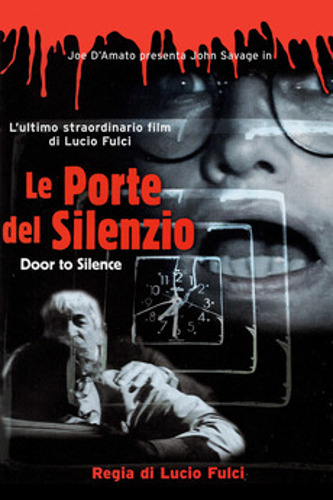
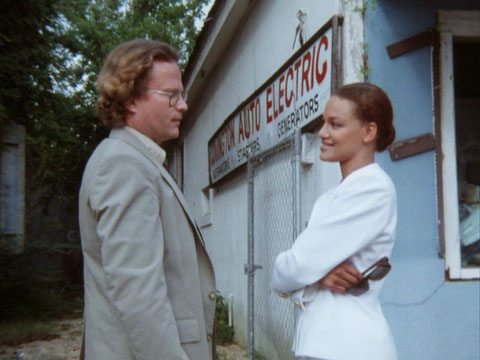
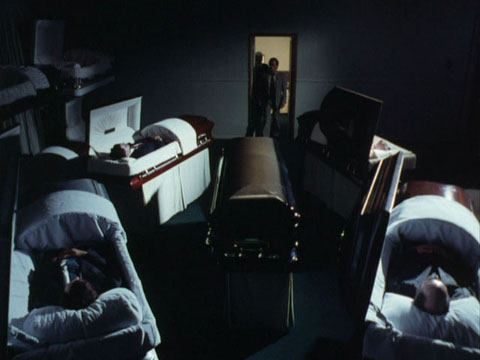

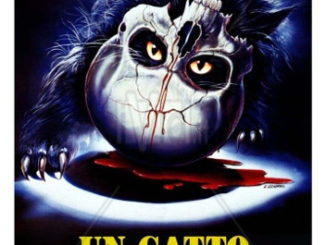

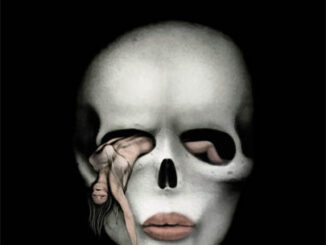
Be the first to comment